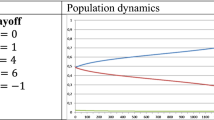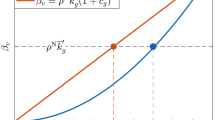Abstract
Ethno-religious conflict in multi-cultural societies has been one of the major causes of loss of life and property in recent history. In this paper, we present and analyze a multi-agent game theoretic model for computational study of ethno-religious conflicts in multi-cultural societies. Empirical fact-based research in sociology and conflict resolution literature have identified (a) ethno-religious identity of the population, (b) spatial structure (distribution) of the population, (c) existing history of animosity, and (d) influence of leaders as some of the salient factors causing ethno-religious violence. It has also been experimentally shown by Lumsden that multi-cultural conflict can be viewed as a Prisoner’s Dilemma (PD) game. Using the above observations, we model the multi-cultural conflict problem as a variant of the repeated PD game in graphs. The graph consists of labeled nodes corresponding to the different ethno-religious types and the topology of the graph encodes the spatial distribution and interaction of the population. We assume the structure of the graph to have the statistical properties of a social network with the high degree nodes representing the leaders of the society. The agents play the game with neighbors of their opponent type and they update their strategies based on neighbors of their same type. This strategy update dynamics, where the update neighborhood is different from the game playing neighborhood, distinguishes our model from conventional models of PD games in graphs. We present simulation results showing the effect of various parameters of our model to the propensity of conflict in a population consisting of two ethno-religious groups. We also compare our simulation results to real data of occurrence of ethno-religious violence in Yugoslavia.
Similar content being viewed by others
References
Ackelson J (2006) Mapping ethnic violence. Int Stud Rev 8(3):492–494
Axelrod R (1984) The evolution of cooperation. Basic Books, New York
Ball P, Betts W, Scheuren F, Dudukovich J, Asher J (2002) Killings and refugee flow in Kosovo, March–June 1999. Report to the Intl Criminal Tribunal for the former Yugoslavia
Barabasi LA, Albert R (1999) Emergence of scaling in random networks. Science 286(5439):509–512
Bhavnani R, Miodownik D, Nart J (2008) REsCape: an agent-based framework for modeling resources, ethnicity, and conflict. Journal of Artificial Societies and Social Simulation 11(2)
Ebel H, Bornholdt S (2002) Coevolutionary games on networks. Phys Rev E 66(5):056–118
Epstein J (2002) Modeling civil violence: an agent-based computational approach. Proc Natl Acad Sci USA 99(Suppl. 3):7243–7250
Goh CK, Quek HY, Tan KC, Abbass HA (2006) Modeling civil violence: an evolutionary multi-agent, game theoretic approach. In: IEEE congress on evolutionary computation, pp 1624–1631
Gurr RT (2000) Peoples versus states: minorities at risk in the new century. United States Institute of Peace Press, Washington
Horowitz DL (2005) Ethnic groups in conflict. University of California Press, Berkeley
Lim M, Metzler R, Bar-Yam Y (2007) Global pattern formation and ethnic/cultural violence. Science 317(5844):1540–1544
Lumsden M (1973) The Cyprus conflict as a prisoner’s dilemma game. J Confl Resolut 17(1):7–32
Luo L, Chakraborty N, Sycara K (2009) Ethno-religious conflicts as prisoner’s dilemma game in graphs. In: Proceedings of international symposium on social intelligence and networking (SIN’09), Vancouver, Canada, Aug 2009
Luo L, Chakraborty N, Sycara K (2010) Modeling effect of leaders in ethno-religious conflicts. In: Proceedings of intl conf on social computing, behavioral modeling, and prediction (SBP’10), Bethesda, MD, USA, 2010
Nowak M, Sigmund K (1989) Game-dynamical aspects of the prisoner’s dilemma. Appl Math Comput 30(3):191–213
Petrovic R (1992) The national composition of Yugoslavia’s population. Yugoslavia Surv 33(1)
Prunier G (2005) Darfur: the ambiguous genocide. Cornell University Press, Ithaca
Santos FC, Pacheco JM, Lenaerts T (2006) Evolutionary dynamics of social dilemmas in structured heterogeneous populations. Proc Natl Acad Sci 103(9):3490–3494
Schelling TC (1971) Dynamic models of segregation. J Math Sociol 1:143–186
Srbljinovic A, Penzar D, Rodik P, Kardov K (2003) An agent based model of ethnic mobilisation. J Artif Soc Soc Simul 6(1)
Szabó G, Fáth G (2007) Evolutionary games on graphs. Phys Rep 446(4–6):97–216
Toft MD (2006) The geography of ethnic violence: identity, interests, and the indivisibility of territory. Princeton University Press, Princeton
UTexasLib (1992) Former Yugoslavia—ethnic majorities from former Yugoslavia: a map folio. URL http://www.lib.utexas.edu/maps/europe/yugoslav.jpg, courtesy of the University of Texas Libraries
Zimmermann MG, Eguíluz VM (2005) Cooperation, social networks, and the emergence of leadership in a prisoner’s dilemma with adaptive local interactions. Phys Rev E 72(5):056–118
Author information
Authors and Affiliations
Corresponding author
Rights and permissions
About this article
Cite this article
Luo, L., Chakraborty, N. & Sycara, K. An evolutionary game-theoretic model for ethno-religious conflicts between two groups. Comput Math Organ Theory 17, 379–401 (2011). https://doi.org/10.1007/s10588-011-9090-x
Published:
Issue Date:
DOI: https://doi.org/10.1007/s10588-011-9090-x




